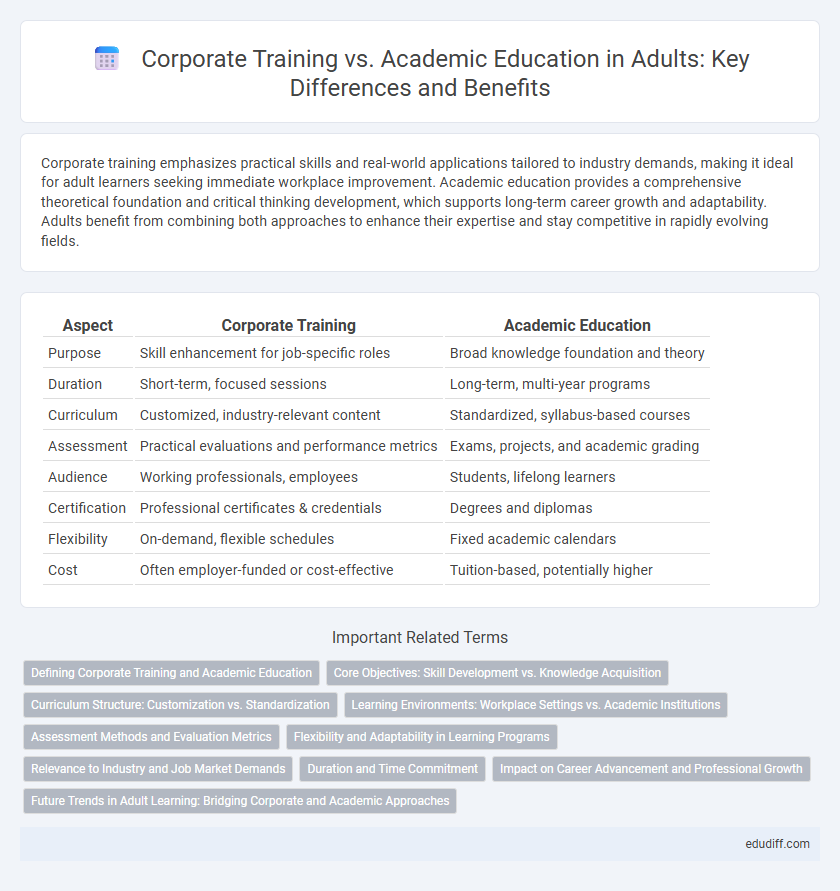Corporate training emphasizes practical skills and real-world applications tailored to industry demands, making it ideal for adult learners seeking immediate workplace improvement. Academic education provides a comprehensive theoretical foundation and critical thinking development, which supports long-term career growth and adaptability. Adults benefit from combining both approaches to enhance their expertise and stay competitive in rapidly evolving fields.
Table of Comparison
| Aspect | Corporate Training | Academic Education |
|---|---|---|
| Purpose | Skill enhancement for job-specific roles | Broad knowledge foundation and theory |
| Duration | Short-term, focused sessions | Long-term, multi-year programs |
| Curriculum | Customized, industry-relevant content | Standardized, syllabus-based courses |
| Assessment | Practical evaluations and performance metrics | Exams, projects, and academic grading |
| Audience | Working professionals, employees | Students, lifelong learners |
| Certification | Professional certificates & credentials | Degrees and diplomas |
| Flexibility | On-demand, flexible schedules | Fixed academic calendars |
| Cost | Often employer-funded or cost-effective | Tuition-based, potentially higher |
Defining Corporate Training and Academic Education
Corporate training focuses on practical skills development tailored to specific job roles and organizational goals, emphasizing real-world applications and immediate workplace performance improvement. Academic education prioritizes theoretical knowledge acquisition, critical thinking, and foundational principles across broad disciplines, often designed for long-term intellectual growth and career flexibility. Corporate training is typically short-term and customized, whereas academic education follows structured curricula and standard assessments.
Core Objectives: Skill Development vs. Knowledge Acquisition
Corporate training emphasizes practical skill development tailored to immediate workplace application, enhancing employee productivity and adaptability. Academic education focuses on broad knowledge acquisition, fostering critical thinking and theoretical understanding across disciplines. Both approaches contribute uniquely to professional growth, with corporate training targeting specific competencies and academic education building foundational expertise.
Curriculum Structure: Customization vs. Standardization
Corporate training programs offer highly customizable curriculum structures tailored to specific job roles, organizational goals, and immediate skill application. Academic education typically follows standardized curricula designed to provide broad foundational knowledge across disciplines, ensuring consistency and accreditation. This divergence enables corporate training to address real-time industry demands, while academic institutions focus on comprehensive, theory-based learning frameworks.
Learning Environments: Workplace Settings vs. Academic Institutions
Workplace settings in corporate training prioritize practical, job-specific skills through hands-on experiences and real-time problem solving, fostering immediate application and adaptability. Academic institutions offer structured curricula emphasizing theoretical foundations, critical thinking, and broad knowledge across disciplines delivered in classrooms or virtual settings. The immersive, goal-oriented environment of corporate training contrasts with the exploratory, research-driven nature of academic education, shaping distinct learning dynamics and outcomes.
Assessment Methods and Evaluation Metrics
Corporate training employs performance-based assessments and real-time feedback to measure skill application and productivity improvements, focusing on key performance indicators (KPIs) and return on investment (ROI). Academic education relies on standardized tests, graded assignments, and cumulative exams to evaluate knowledge retention and theoretical understanding, emphasizing GPA and credit accumulation. The effectiveness of corporate training is often gauged through on-the-job performance and business impact, while academic evaluation prioritizes mastery of curriculum content and intellectual development.
Flexibility and Adaptability in Learning Programs
Corporate training programs prioritize flexibility and adaptability by offering tailored, on-demand modules designed to meet specific organizational goals and evolving market needs. In contrast, academic education follows structured curricula with fixed schedules, often limiting personalization and rapid content updates. This adaptability in corporate training enhances skill relevance and accelerates workforce development in dynamic industries.
Relevance to Industry and Job Market Demands
Corporate training offers tailored skill development aligned directly with current industry standards and evolving job market demands, ensuring immediate applicability and enhanced workforce productivity. Academic education provides foundational knowledge and critical thinking skills but may lag in adapting quickly to specific sector trends and technological advancements. Employers increasingly value corporate training for practical expertise, while academic education supports long-term career growth through comprehensive understanding.
Duration and Time Commitment
Corporate training typically offers shorter, intensive programs designed to fit into employees' work schedules, often ranging from a few hours to several days or weeks. Academic education requires a longer-term commitment, spanning months to years, with structured semesters and set class times. This difference in duration and time commitment makes corporate training more flexible and immediately applicable, while academic education provides comprehensive, in-depth knowledge over time.
Impact on Career Advancement and Professional Growth
Corporate training equips professionals with practical skills and industry-specific knowledge, accelerating career advancement by enhancing job performance and adaptability. Academic education provides a foundational theoretical framework and critical thinking abilities, essential for long-term professional growth and leadership development. Combining both approaches maximizes career progression opportunities and fosters continuous skill enhancement in dynamic business environments.
Future Trends in Adult Learning: Bridging Corporate and Academic Approaches
Corporate training increasingly integrates personalized digital platforms and microlearning modules, accelerating skill acquisition aligned with industry demands. Academic education emphasizes interdisciplinary curricula and research-driven knowledge, fostering critical thinking and adaptability essential for future workforce challenges. Blending corporate agility with academic rigor creates a holistic adult learning ecosystem that supports continuous professional development and lifelong learning.
Corporate training vs Academic education Infographic

 edudiff.com
edudiff.com